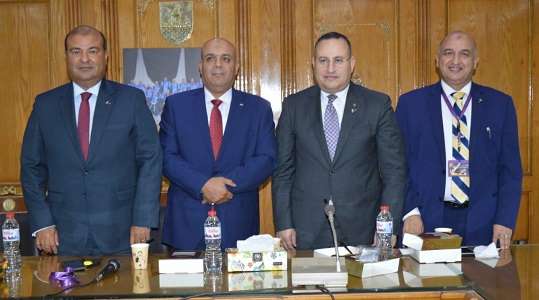The Secretary-General of the Union of Arab Chambers, Dr. Khaled Hanafy, stressed during a speech he delivered at the opening of the Nineteenth International Scientific Conference organized by the Faculty of Commerce at Alexandria University entitled: The Role of Innovation, Knowledge and Digital in Supporting Business Organizations, on the 9th and 10th of September this year, "Digitization has turned companies' operations, systems and business models upside down, as international figures indicate that 40 percent of business companies will disappear within the next ten years if they cannot change their institutions to accommodate new technologies".
Hanafy called on governments to "develop a joint Arab indicative digital strategy and national digital strategies with a date for updating and considering the sustainable development goals. As well as investing in high-quality digital infrastructure, investing in fixed and mobile broadband networks, and encouraging development through the establishment of smart cities. In addition to developing the necessary legislation, laws and incentives for the digital transformation of the economy and to attract the world’s leading technology companies and setting policies to encourage and support innovative new business models.”
He stressed that "reforms are also required to improve e-commerce logistics and the reliability of electricity supplies, without which the Internet cannot function, current inefficiencies in e-commerce logistics—unified addressing systems, area codes, postal service, land, and customs clearance—delay delivery and raise the costs of online commerce.”
Hanafy explained that "highly skilled university graduates represent 30% of the total unemployed workers in the region, and many of them are women, on this basis, it is necessary to develop the research and development system in universities and establish coordinating frameworks to link academic bodies with the private sector, similar to the existing cooperation between the Union of Arab Chambers and the Arab Academy for Science, Technology and Maritime Transport.”
He said: “In fact, the direction of the journey is very clear, as science and technology are developing very quickly, from here the story will not end at the fourth industrial revolution, because we have practically entered a new stage with the start of the fifth industrial revolution 5IR, where minds converge with the machine, the use of smart devices will decline to be replaced by brain-computer interfaces, through which minds can communicate with each other and with machines. Therefore, it is important to reconsider the goals and move from degenerative to regenerative, distributive and more comprehensive models to enable a more comprehensive private sector that contributes to a real shift towards sustainability to serve economic and social needs and provide sufficient job opportunities and better standards of living for the Arab citizen.”
The opening session included speeches by: President of Alexandria University Abdel Aziz Kansowa, President of the Conference, Dean of the Faculty of Commerce at Alexandria University, Al Saiid El-Saifi, Vice-President of the Conference, Vice-President of the College of Commerce for Community Service and Environmental Development Affairs, Alaa Al-Gharabawi, and Vice-President of the Arab Federation for Digital Economy, Adviser to the British Cambridge International College, Abdel-Wahab Ghoneim.
It is worth noting that during the conference discussions were held and a set of innovative experiences were presented that reflect the permanent change in the economic and innovative aspects of Egyptian life, such as the experience of the Egyptian Post for digital transformation, as well as the innovative practices of the National Bank of Egypt. During the two days of the conference, thought leaders, economics, media, universities and strategic experts discussed issues of innovation, knowledge and digitization and their role in changing the economic, educational and institutional life of the economy, society and the Egyptian reality.

